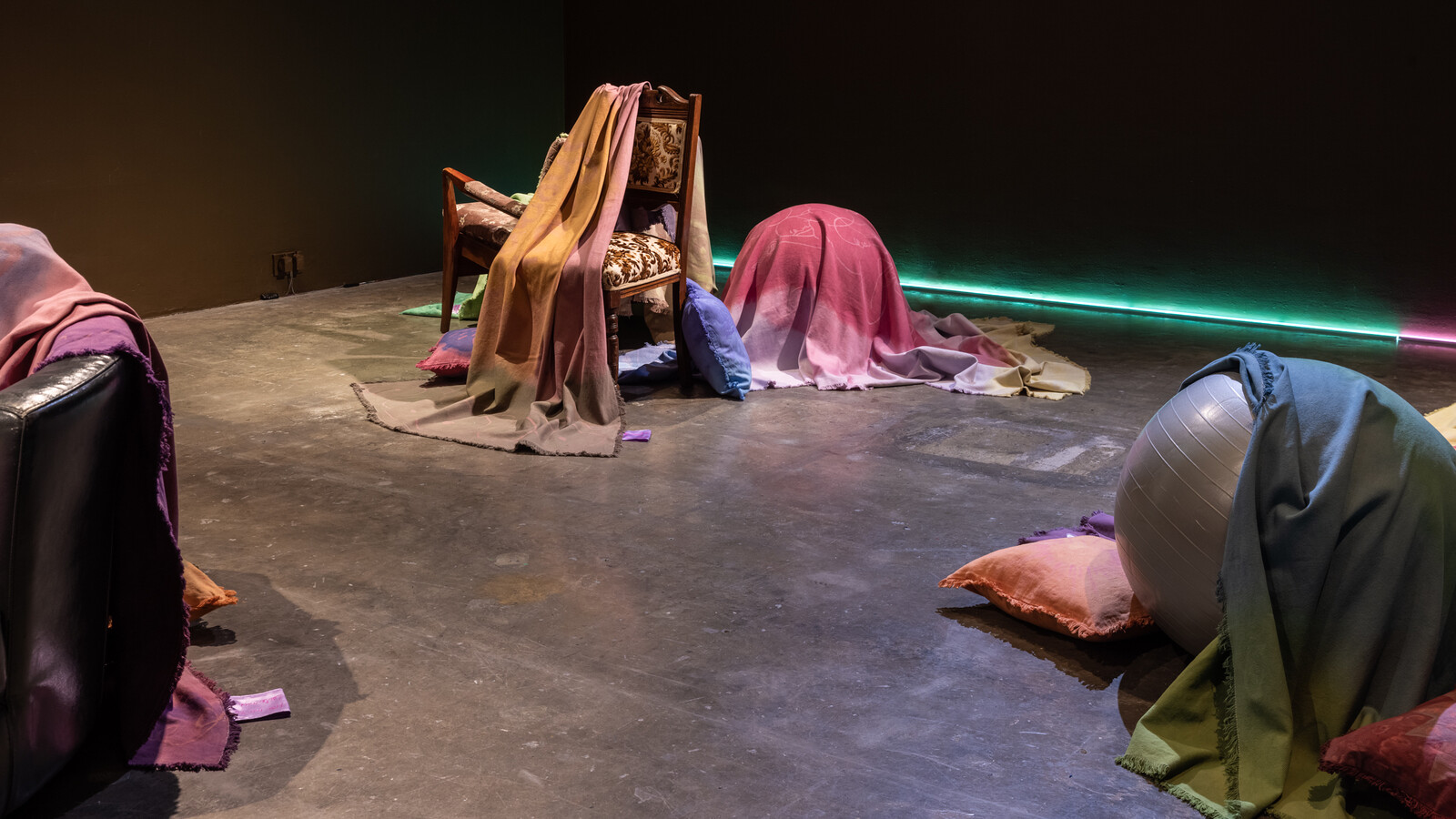February 3–March 18, 2023
39 East Essex Street
Temple Bar
Dublin
Ireland
Hours: Monday–Saturday 11am–5pm
T +353 1 881 9613
box-office@projectartscentre.ie
Artists: Nora Heidorn & Lynne Kouassi, Ketty La Rocca, David McGovern, Julie Morrissy, Harold Offeh
The standard enlightenment representation of the human body is of a singular, upright, able-bodied man, gazing forward. This group exhibition pays caring attention to reclined bodies and to bodies inclined towards each other, favouring a model of the human as interdependent and reliant.
We encounter reclined bodies in different situations in our lives, in images, and in stories: persons sleeping or resting, having sex, the unwell, injured or deceased. Common tropes include the reclined nude, the fallen soldier, the psychoanalysis patient, and the birthing woman. Being horizontal, and especially being looked at and imaged in positions of recline, is often associated with feminised and racialised powerlessness. Deliberately assuming a horizontal position in front of others can also challenge, subvert, and politicise dynamics of vulnerability and power.
This exhibition explores what moving out of the vertical plane and into varying degrees of inclination might indicate about being in relation, about interdependency and care. For example, how might the simple but charged acts of lounging, reclining, or leaning be reimagined as critiques of the neoliberal drives for efficiency, productivity, speed, and independence?
Harold Offeh has made a billboard for the façade of Project Arts Centre. The artist is seen lounging between palm trees and Big Ben in London’s government district. He lies leisurely on his side with one raised knee, a pose from 1980s RnB record covers by Black male musicians that Offeh embodies in his ongoing series Lounging. As the art critic and queer activist Craig Owens asserted, “to strike a pose is to pose a threat”.
The exhibition presents three moving-image works from David McGovern’s artistic research project Hardcare. The videos are concerned with the care for fragile bodies through clinical encounters, pharmaceuticals, healthcare technologies—and through informal practices at the fringes of care. McGovern pays particular attention to the materials of care: the blister pack holding pills, the whirring of the MRI machine, the vein about to be pricked, the letter from the hospital.
Lynne Kouassi & Nora Heidorn’s painted and dyed blankets feature knots of overlapping bodies squatting, standing, leaning, holding, bending, and lying. These poses have been adapted from an historical obstetrics book that catalogues positions for labour according to racial hierarchies. Kouassi and Heidorn have modified and collaged the source imagery, which is still in use in books about birthing today, to create complex, at times orgiastic, scenes of bodies in intimate relations of care. The textiles are draped over vacant armchairs and exercise balls that suggest supports for bodies, as well as corporal presences resting in the gallery.
Ketty La Rocca made shiny black sculptures of the letter “j” during the late 1960s, highlighting the anthropomorphic quality of its head and tail. The letter is short for “je,” French for “I.” In later work, La Rocca would repeatedly inscribe the word “you,” emphasising her deep engagement with the reciprocity of language and a playful consideration of forms of subjecthood. In three photographs on show, she performs with waist-high “j”s that stand upright in a group around her body resting in the grass or lie in bed with her like a lover.
Julie Morrissy has written a new poem for this exhibition, which is printed on long strips of paper reminiscent of disposable measuring tapes from IKEA showrooms. Metre considers the intimacy and lazy pace of leisure time spent with friends in contrast with the speedier rhythms required by the “upright world”. Visitors are invited to take the poem home or to pass it on to someone. On Project Arts Centre’s website, remote visitors can read Morrissy’s Come In, Lie Down, a prose piece written in response to this exhibition’s themes of rest and resistance.
Curated by Nora Heidorn.
With thanks to The Estate of Ketty La Rocca.
Please contact Sorcha FitzGerald at sorcha [at] projectartscentre.ie for further information.









